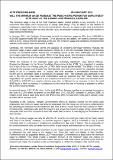Basic Needs Basket (BNB) For January 2011: Will the Minimum Wage Increase the Purchasing Power for Employees? JCTR Asks as the Lusaka BNB Reaches K3,000,000
Date
2011-02-05Author
Jesuit Centre for Theological Reflection
Type
StatementLanguage
enItem Usage Stats
58
views
views
12
downloads
downloads
Abstract
The minimum wage is one of the most important labour market policies in any economy. It is an instrument that raises much debate due to mainly three things. First, its effects on the welfare of employees, especially those in the low-income brackets. Second, its impact on the cost of production and, third, its legal implication as once decided upon, an employer cannot legally pay their workers a wage below the threshold.
In January 2011, the Zambian Government revised the minimum wage by 56% from K268,800 to K419,000 (approximately $90) per month. Once allowances are added, the monthly minimum wage rises to K767, 100 up from the previous K499,440. The minimum wage and conditions of employment statutory instruments were last revised in 2006.
Description
The minimum wage is one of the most important labour market policies in any economy. It is an instrument that raises much debate due to mainly three things. First, its effects on the welfare of employees, especially those in the low-income brackets. Second, its impact on the cost of production and, third, its legal implication as once decided upon, an employer cannot legally pay their workers a wage below the threshold.
In January 2011, the Zambian Government revised the minimum wage by 56% from K268,800 to K419,000 (approximately $90) per month. Once allowances are added, the monthly minimum wage rises to K767, 100 up from the previous K499,440. The minimum wage and conditions of employment statutory instruments were last revised in 2006.
Generally, the minimum wage serves the purpose of protecting low-wage workers. Raising the minimum wage creates ripple socio-economic effects as it has the immediate potential of reducing poverty as increased income boosts the purchasing power of the most vulnerable workers and encourages spending on basic needs. Other things being equal, this stimulates production to meet the increased demand and ultimately contribute towards economic development.
“While the increase of the minimum wage was seemingly significant”, says Miniva Chibuye, Programme Manager for the Social Conditions Programme at the JCTR, “it is important to analyse this in light of the cost of living using the JCTR’s Basic Needs Basket (BNB)”. The BNB is a tool that measures the average cost of basic food and essential non-food commodities for a Zambian average family of six in a specific town. In Lusaka, the BNB recorded a considerable increase from K2,897,430 in December 2010 to K3,019,100 in January 2011. The increase was attributed to the rise in the cost of some basic food commodities such as Kapenta, Dry fish, Meat, Beans and Vegetables. An upward adjustment in the essential non-food items such as water and sanitation from K114,530 to K210,000 in a medium density area also contributed to the increase. In fact, the total BNB figure is likely to increase in subsequent months once the cost of housing is adjusted to reflect the current housing rentals.
